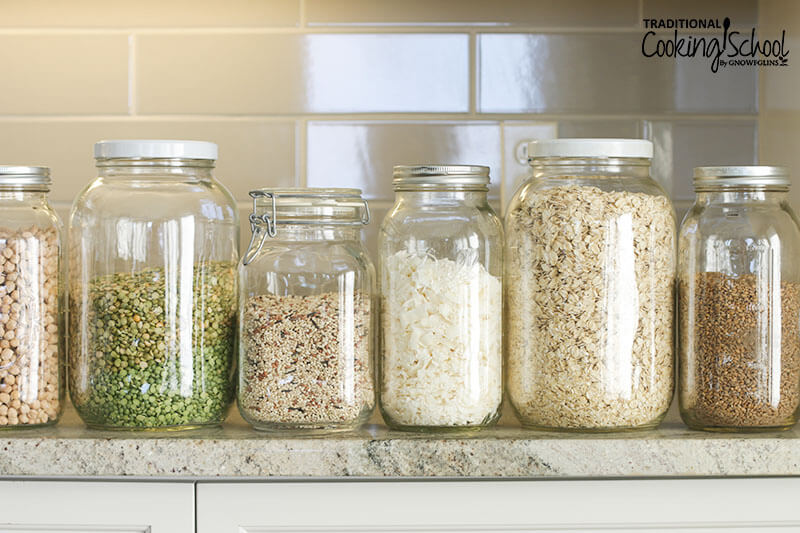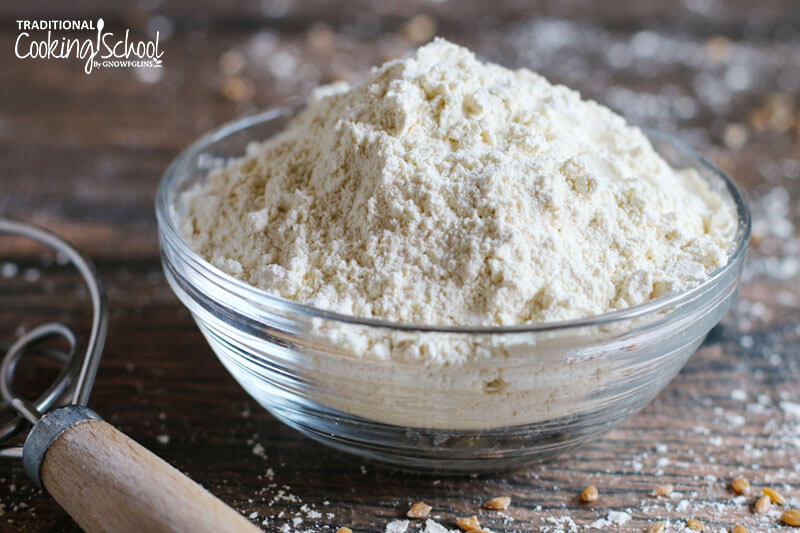To protect your investment, you need to know how to properly store flour and grains in bulk… Will wheat and rice, einkorn and more stay fresh in the pantry, or is the freezer best? Here’s everything you need to know about long term food storage of flour and grains at home!

You bring home a big bag of grains or flour… now what do you do with it?
How do you store it so it doesn’t go bad and to protect your investment?
On today’s #AskWardee, I’m sharing how to store flour and grains!
Keep reading or watching below to learn more!
Subscribe to #AskWardee on iTunes, Stitcher, YouTube, or the Podcasts app.
Table Of Contents
The Question: How Should I Store My Flour & Grains?
Tara S. asked:
Can you provide some suggestions for storage of larger amounts of flours/grains/etc. The stores seem to be hit and miss on the 5# bags, but some still have the 20#. I’m just not sure how to store that much flour/grain/rice/etc. I’d be especially thankful if you can show visuals of storage vessels, pantry, countertop, etc. so I can visualize what to do to store this amount of product and still have a usable pantry, cabinet, etc.
Tara, thank you for your question!
Because we’re featuring your question today’s #AskWardee, you’re getting a gift — a FREE eBook and Video Package! Our team will be in contact with you so you can choose which one you’d like!
How To Store Flour & Grains
Piggybacking on last week’s episode (Where To Buy Whole Wheat Berries, Grains, And Flour #AskWardee 148), once you get your flour or berries, you need to protect that investment with proper storage!
Here’s how…

Whole Grains
Bring home, then freeze for 10 days to kill any critter larvae/eggs. If you have a large bag (15# to 50#), split it up into smaller bags.
Once the 10 days are up, you can keep the grains in the freezer or transfer them to storage containers such as 5-gallon food-grade buckets with gamma seal lids. (Use mylar bags and oxygen absorbers inside the buckets if for long-term storage.)
Or, use other airtight containers such as glass jars. You can even seal up Mason jars using this jar sealer attachment for a Food Saver vacuum sealer!
Store the grain in a dry, cool place. No heat or moisture source nearby. Not in a hot attic, damp basement, or humid garage. Not near a water heater or clothes dryer.
If kept cool, dry, dark and critter-free, your whole grains will last many, many years (and even still sprout)!
Sprouted grains should be stored similarly.

Milled Grains (Flour)
If keeping at room temperature, put in zipper seal bags or glass jars and use within three days of grinding. Milled grains should not be stored at room temperature for more than three days because of the danger of rancidity.
Otherwise, refrigerate for up to seven days or freeze up to six months.
Sprouted flour should be used/stored similarly. Although it does last longer than unsprouted, I follow these guidelines to be on the safe side of rancidity.
If you’re interested in milling your own flour, take a look at the home stone grain mill I recommend — the Mockmill. Get free gifts from me when using my link to shop: https://traditionalcookingschool.com/mockmill If you do purchase a Mockmill using my link (required), claim your free gifts worth $128 from me right here!
Sprouted Grains Or Flour
If you’re learning how to sprout grains, you may wonder how to store them.
If sprouted whole berries, follow the Whole Grains guidelines above. If sprouted flour, follow the guidelines for Milled Grains above.
Here’s more information on how to soak & cook whole grains and how long will sprouted grains last.
Free “Home Grain Milling 101” eBook!
 Want our FREE “Home Grain Milling 101” eBook? Click here to download the “Home Grain Milling 101” eBook for FREE!
Want our FREE “Home Grain Milling 101” eBook? Click here to download the “Home Grain Milling 101” eBook for FREE!
Any Questions Or Comments?
If you have other questions or comments about your own experience with storing whole grains or flour, be sure to leave them in the comments!
Helpful Links
- FREE Home Grain Milling 101″ eBook
- Gamma seal lids
- Mylar bags for food storage
- Oxygen absorbers for food storage
- Mason jar sealer attachment for a Food Saver vacuum sealer
- Mockmill (I recommend the 100 or the Lino 100)
- Claim your FREE ($128 value) bonuses from me with your purchase of the Mockmill here!
More Mockmill Related Articles from the #AskWardee Show:
- Unboxing The Mockmill (Affordable Home Stone Grain Mill)
- Differences Between Nutrimill And Mockmill #AskWardee 120
- How To Simply & Easily Clean Your Mockmill Grain Mill #AskWardee 119
- Where To Buy Whole Wheat Berries, Grains, and Flour #AskWardee 148
- Buckwheat Flour 101: Choosing, Milling Flour, Sprouting, Recipes & More! #AskWardee 141
- Milling Soft Wheat In A Grain Mill {Homemade Pastry Flour} #AskWardee 131
- Is The New Ultragrain White Whole Wheat Healthy? #AskWardee 112
How do you store whole grains and flour? Share in the comments below!
We only recommend products and services we wholeheartedly endorse. This post may contain special links through which we earn a small commission if you make a purchase (though your price is the same).



I had just read on the CDC site about freezing to kill tiny bugs They said freeze again in 30 days when eggs hatch as the first freeze won’t kill the eggs. I didn’t double check any other resource so this might need verification.
Hi, Kathy.
Wardee does not refreeze. Her process is outlined in this episode.
~Danielle, TCS Customer Success Team
Azure Standard has a better price on the Gamma Seal Lids than Amazon. Eight dollars each rather than $18.70 Amazon.
Hi Kay.
Azure Standard is a great choice if you’re near a Drop point. For me, shipping would be a minimum of $14.84 on 3 lids. :/
~Danielle, TCS Customer Success Team
Oh my! So the store bought flour I buy, is essentially already expired when I buy it? So I should only be buying whole grains and milling them myself?
Oh my! So the store bought flour I buy, is essentially already expired when I buy it? So I should only be buying whole grains and milling them myself?
thank you!
Many families don’t have freezer space to freeze grains, even for 10 days. I don’t have problems myself w/not freezing first.
I leave the grains (OR BEANS) in sealed plastic bags or take out of paper bags and put into glass pickle jars (or plastic containers if you must). The huge plastic bins from Costco are good to lie big paper sacks (50-100#) of grains in and the cover locks in place, keeping moisture out.
New trash cans with tight lids can even work. Again, keep the grain in the paper sack.
Keeping out vermin and moisture is your biggest concerns w/grains and beans.
RE: freezer time for grains; I recently read that 72 hours was adequate time to kill bugs, not 10 days? That’s a big difference. Also, if I’m sprouting my gains do I have to freeze them? Thanks.
Hi, Joanne.
We recommend 10 days before doing anything with your grains unless you are milling and baking right away.
~Danielle, TCS Customer Success Team
It must depend on where you buy your grains from. I buy from Azure Standard, and I’ve never had a problem with bugs. Straight home from picking them up, and into screw-lid buckets with seals. I’ve had different varieties of wheats, whole corn, and barley for more than two years and have had no issues. I’ve heard it can be a problem, but I’ve had more problems over the years with chicken feeds and bird food from feed stores, and occasionally things from the grocery store. So far, no problems with my whole grains.
I’m confused about the whole feezing thing. I don’t mill my own grains. Is it necessary to freeze the flour before use too?
I have bought already milled flour from jovial and used it right away, storing in plastic containers. Didn’t see any bug issues. Just received 10 # of whole grains already milled flour from Grand Teton Farm & Mill, since Jovial was sold out. Date on bag actually milled, which I liked. April 24 and received it April 27.
Hi, Roseann: Wardee does recommend storing flour in the refrigerator for up to seven days or in the freezer for up to six months as you are using it in your baking. This is to avoid rancidity. I hope that helps! —Sonya, TCS Customer Success Team
Does this process apply for legumes? Pinto beans, Kidney beans? Thanks!!
Yes, I would do this for beans as well. 🙂
~Peggy, TCS Customer Success Team
I am wondering HOW to store MASHED potatoes (25 lb)
And
HOW to Store DRY MILK POWDER (Also 25lb)
I know EVERYONE says to use MYLAR bags….BUT…
Deep down isn’t THAT bad for our food??
To store our food next to a chemical/synthetic compound of sorts?
|
Hi, Barbara: These items would be best stored in BPA-free vacuum seal bags. —Sonya, TCS Customer Success Team
Hi, I’m new to freezing whole grains too. I am wondering, what do you do after taking the grains out of the freezer? I mean they will be damp. Do I dry them in the oven or let them air dry? Thank you for any help.
Hi, Melanee: Depending upon how you store the grains in the freezer, you might notice condensation on the outside, but the grains themselves should not be damp (especially if you store them in plastic zipper bags). If they are damp, you can simply air-dry them before storing them at room temperature. —Sonya, TCS Customer Success Team
If I buy a 25 lb bag of spelt flour from Azure Standard, should I store what I’ll use for the first week in the fridge, and the rest in the freezer for up to 6 months? If yes, I’ve been doing it all wrong! If so, then really, the only way to store long-term (over 6 months) is whole grains? Thank you!
Hi, Mary: Yes, your thinking is correct! And yes, whole grains are best for long-term storage. That way, you can grind the grain into flour as you need it for the freshest possible flour. —Sonya, TCS Customer Success Team
I have a couple questions from this. I put my grains in the freezer in ziploc freezer bags… Do I need to make sure they come to room temp before putting them in the bucket? I just poured the rice in and now I’m worried there will be condensation in the bucket.
2. the Mylar bags smell TERRIBLE. I’m scared to put my grains in there and then have chemicals and/or smell like that. Do they off gas? Are they really safe to use with that much smell?
Thank you so much in advance for your help.
best,
Rebecca
Hi, Rebecca.
Wardee does make sure hers come to room temp before storing in mylar bags.
She said her mylar bags don’t give off a scent.
I would suggest leaving them unpackaged for awhile to off-gas and see if that helps.
It is a toss-up for sure. We don’t always have the best materials for long-term storage and have to do the best we can.
Your other option is BPA free vacuum seal bags that can go in food grade buckets with gamma seal lids.
~Danielle, TCS Customer Success Team
We eat a lot of minuet oats. Can I store this like the other grains???
We don’t recommend minute oats, here is a post on some health nourishing oatmeal recipes:
https://traditionalcookingschool.com/food-preparation/recipes/33-nourishing-oatmeal-and-noatmeal-recipes/
I would buy organic oats and follow storage instructions above. 🙂
~Peggy, TCS Customer Success Team